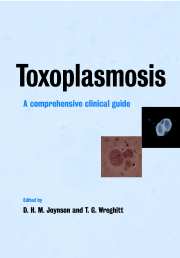Book contents
- Frontmatter
- Contents
- List of contributors
- Preface
- Historical perspective
- 1 Biology of toxoplasmosis
- 2 Immunology of toxoplasma infection
- 3 The epidemiology of toxoplasma infection
- 4 Infection in the immunocompetent
- 5 Toxoplasma infection in HIV-infected patients
- 6 Toxoplasma infection in immunosuppressed (HIV-negative) patients
- 7 Maternal and foetal infection
- 8 Prenatal screening for toxoplasma infection
- 9 Newborn screening for congenital toxoplasma infection
- 10 Infections in neonates and infants
- 11 Ocular infection
- 12 Laboratory diagnosis of toxoplasma infection
- 13 Antitoxoplasma chemotherapy
- 14 Toxoplasma vaccines
- Appendices: protocols for treatment and management
- 1 Suggested treatment protocols
- 2 Management of toxoplasma infection in pregnancy
- 3 Hygiene measures to prevent infection
- 4 Classification system and case definitions of Toxoplasma gondii infection in immunocompetent pregnant women and their congenitally infected offspring
- Index
2 - Immunology of toxoplasma infection
Published online by Cambridge University Press: 24 September 2009
- Frontmatter
- Contents
- List of contributors
- Preface
- Historical perspective
- 1 Biology of toxoplasmosis
- 2 Immunology of toxoplasma infection
- 3 The epidemiology of toxoplasma infection
- 4 Infection in the immunocompetent
- 5 Toxoplasma infection in HIV-infected patients
- 6 Toxoplasma infection in immunosuppressed (HIV-negative) patients
- 7 Maternal and foetal infection
- 8 Prenatal screening for toxoplasma infection
- 9 Newborn screening for congenital toxoplasma infection
- 10 Infections in neonates and infants
- 11 Ocular infection
- 12 Laboratory diagnosis of toxoplasma infection
- 13 Antitoxoplasma chemotherapy
- 14 Toxoplasma vaccines
- Appendices: protocols for treatment and management
- 1 Suggested treatment protocols
- 2 Management of toxoplasma infection in pregnancy
- 3 Hygiene measures to prevent infection
- 4 Classification system and case definitions of Toxoplasma gondii infection in immunocompetent pregnant women and their congenitally infected offspring
- Index
Summary
Pathogenesis of toxoplasmosis
The infection of immunocompetent individuals with Toxoplasma gondii most often results in an asymptomatic infection or occasionally in an infectious mononucleosis-type illness (Luft & Remington 1988). However, clinical toxoplasmosis is frequently associated with immune-deficient individuals and maternal–foetal transmission of this parasite causes congenital disease (Remington et al. 1994). In order to appreciate the disease caused by T. gondii it is important to have an understanding of the basic biology of this infection and how protective immunity to this parasite is mediated. The ability of the tachyzoite stage of the parasite to invade any nucleated cell, replicate and then lyse the host cell before invading neighbouring cells is an important element that underlies the pathogenesis of this cytolytic infection. In the absence of a protective immune response, the parasite will replicate in an unrestricted manner and destroy infected tissues. Moreover, since the tachyzoite stage of the parasite is intracellular, it is protected from the effects of the humoral immune response. As a consequence, the protective response needed to control this parasite is dominated by cell-mediated immunity, and in particular the production of the cytokine interferon-γ (IFN-γ). The events that lead to the production of IFN-γ and its protective effects are discussed in greater detail below.
The presence of a ‘latent’ stage of T. gondii in the infected host also represents an important aspect of toxoplasmosis. Tachyzoites can transform into bradyzoites which are found within cysts in many tissues, but in particular the brain and muscle.
- Type
- Chapter
- Information
- ToxoplasmosisA Comprehensive Clinical Guide, pp. 43 - 57Publisher: Cambridge University PressPrint publication year: 2001
- 3
- Cited by



